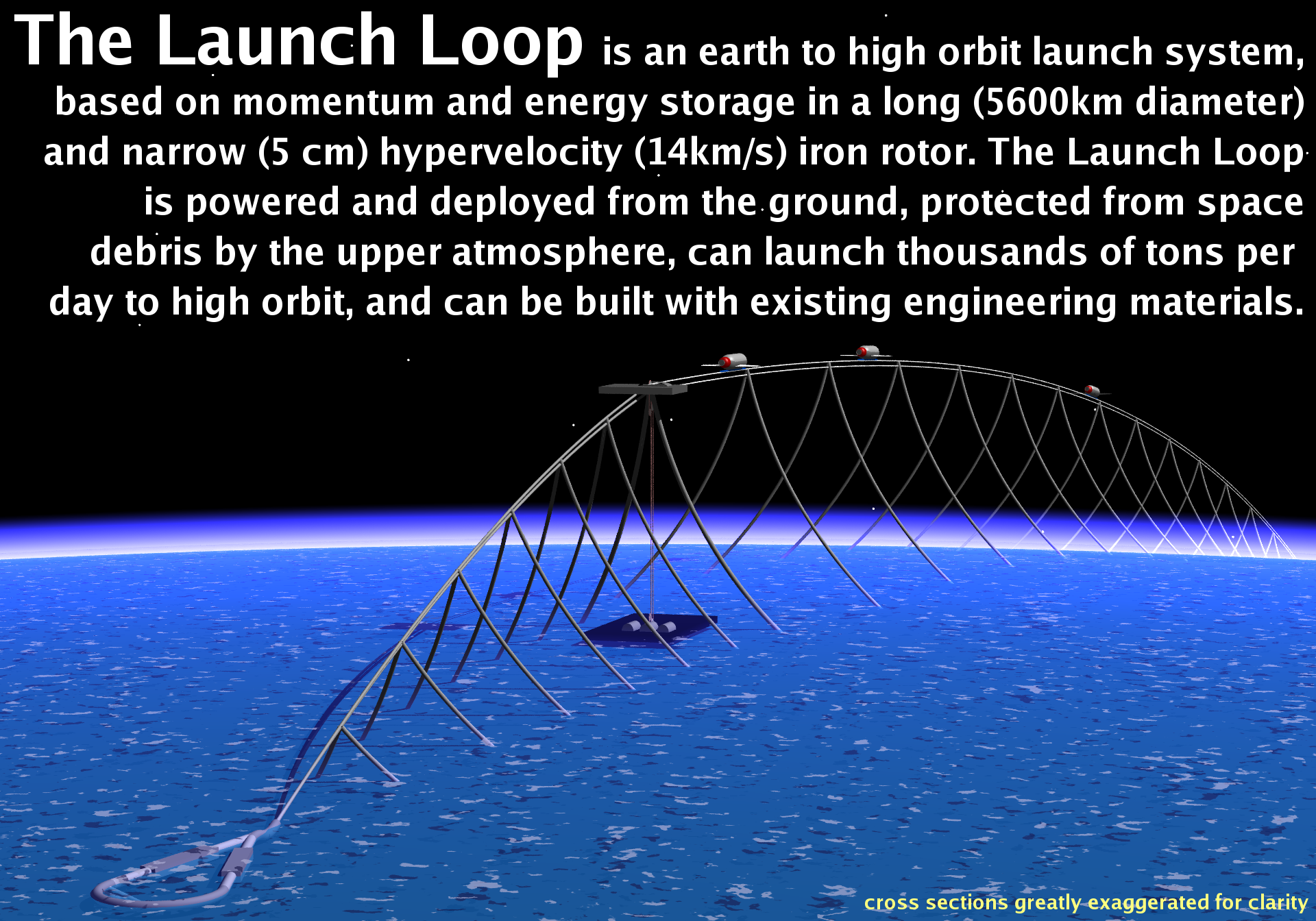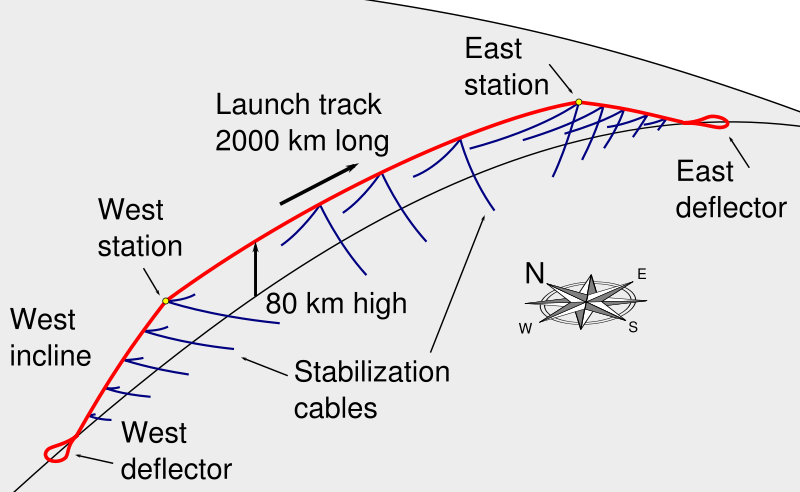Start loop: launch of payload into orbit for $ 3 / kg
UPD3: for the day "pseudo-collected" $ 1.000.000 and more than 500 who want to fly into space
“The planet is the cradle of the mind, but you cannot live in the cradle forever.” Tsiolkovsky

Dear readers, I bring to your attention an idea that really stands for distribution and implementation.
')
In the comments to the post " 3d printer will print space structures directly in orbit " for the first time I saw the mention of the technology " starting loop "
I was struck by the fact that this is a complete (that is, not demanding not yet existing resources, as heavy-duty materials) technology, in contrast to other technologies of missile-free space launch .
The only thing missing is the demand for this service.
TTX "Loops"
Overload Level - 3g
The amount of cargo per year - 6.000.000 tons (six million tons)
Starting frequency - 80 starts per hour
Payback period - 5 years
Installation cost - $ 30 billion (Sochi 2014 budget - 950+ billion rubles. Proof )
The cost of putting 1 kg of payload into orbit is $ 3 (three dollars per kg)
Link to an article on Wikipedia with a detailed description of the project
Existing problems in space launches
At the moment there are 2 classes of problems - it is overload and strength of materials.
For the "gun" technologies ( gun , catapult , slingatron ) inherent gigantic overload .
For " elevators ", " fountains ", " trams , bridges " we need unrealistically strong and at the same time light materials, since dimensions of structures should be tens of thousands of kilometers and at the same time vertically oriented.
Well, yes, an ordinary rocket and orbital plane is expensive (the cost of outputting 1 kg is about $ 4,000)
The starter loop gracefully circumvents these difficulties.

(Starting loop (not scaled). The red line is the moving loop itself, the blue lines are stabilization cables. In section, the objects have centimeter dimensions. The whole structure is invisible from a distance)
First, it is “wider than high” (2,000 km long and 80 km high) and does not require heavy-duty materials.
Secondly, it allows launching ships of up to 5 tons in mass using electromagnetic acceleration, both to near-Earth orbit and beyond. Acceleration is carried out on a flat portion of the cable, which is located outside the dense atmosphere.
So, what we have:
- the loop can be built now, using the available materials, energy and technology
- Loop more environmentally friendly than current missiles
- high security loop
- acceptable economic performance
- comfortable conditions for the flights of people (overloads of only 3g and the absence of a radiation threat)
To Do list from the official site (I will be grateful for the translation)
I invite you to discuss, write your ideas, suggestions in the comments.
Presentation of the project in English from the conference ISDC2002
Materials from the 2009 conference
Project site - http://launchloop.com
“We must move deep into the universe. Only in this way will humanity save itself from earthly wars and politics. Become an astronaut and go on a space trip to find God within yourself. ”Ray Bradbury
P.S. article with some calculations trendclub.ru/blogs/space_future/7119
(UPD: a disclaimer from the author of the article http://habrahabr.ru/post/196616/ )
P.P.S. Or is this an acceptable waste disposal option?
“The planet is the cradle of the mind, but you cannot live in the cradle forever.” Tsiolkovsky

Dear readers, I bring to your attention an idea that really stands for distribution and implementation.
')
In the comments to the post " 3d printer will print space structures directly in orbit " for the first time I saw the mention of the technology " starting loop "
I was struck by the fact that this is a complete (that is, not demanding not yet existing resources, as heavy-duty materials) technology, in contrast to other technologies of missile-free space launch .
The only thing missing is the demand for this service.
TTX "Loops"
Overload Level - 3g
The amount of cargo per year - 6.000.000 tons (six million tons)
Starting frequency - 80 starts per hour
Payback period - 5 years
Installation cost - $ 30 billion (Sochi 2014 budget - 950+ billion rubles. Proof )
The cost of putting 1 kg of payload into orbit is $ 3 (three dollars per kg)
Link to an article on Wikipedia with a detailed description of the project
Existing problems in space launches
At the moment there are 2 classes of problems - it is overload and strength of materials.
For the "gun" technologies ( gun , catapult , slingatron ) inherent gigantic overload .
For " elevators ", " fountains ", " trams , bridges " we need unrealistically strong and at the same time light materials, since dimensions of structures should be tens of thousands of kilometers and at the same time vertically oriented.
Well, yes, an ordinary rocket and orbital plane is expensive (the cost of outputting 1 kg is about $ 4,000)
The starter loop gracefully circumvents these difficulties.

(Starting loop (not scaled). The red line is the moving loop itself, the blue lines are stabilization cables. In section, the objects have centimeter dimensions. The whole structure is invisible from a distance)
First, it is “wider than high” (2,000 km long and 80 km high) and does not require heavy-duty materials.
Secondly, it allows launching ships of up to 5 tons in mass using electromagnetic acceleration, both to near-Earth orbit and beyond. Acceleration is carried out on a flat portion of the cable, which is located outside the dense atmosphere.
So, what we have:
- the loop can be built now, using the available materials, energy and technology
- Loop more environmentally friendly than current missiles
- high security loop
- acceptable economic performance
- comfortable conditions for the flights of people (overloads of only 3g and the absence of a radiation threat)
To Do list from the official site (I will be grateful for the translation)
I invite you to discuss, write your ideas, suggestions in the comments.
Presentation of the project in English from the conference ISDC2002
Materials from the 2009 conference
Project site - http://launchloop.com
“We must move deep into the universe. Only in this way will humanity save itself from earthly wars and politics. Become an astronaut and go on a space trip to find God within yourself. ”Ray Bradbury
Why does humanity need space? (Articles and video)
Russian reporter "10 ideas about space"
RIA Novosti Why does man need space?
Alexander Onoprienko Why a man in space
Sergey Pereslegin's thoughts:
Article "In the cradle. Space as an opportunity for salvation "
TEDx Performance
Cosmos as thinking
By the day of astronautics. Pereslegin: why do we need space?
Systems Engineering vs. Space
"Space: funny and sad results"
"... people are idiots. They did a lot of stupid things: they invented costumes for dogs, the position of advertising manager and things like the IPhone, without getting anything in return but a sour aftertaste. But if we developed science, mastered the Moon, Mars, Venus ... Who knows , what would the world be like then? Humanity was given the opportunity to surf the cosmos, but it wants to engage in consumption: drink beer and watch TV shows. "
Ray Bradbury
RIA Novosti Why does man need space?
Why is Stephen King afraid of Russians?
“For the first time, I experienced horror — genuine horror, not a meeting with demons or ghosts living in my imagination — on one October day in 1957. I just turned ten. And, as expected, I was in the cinema - at the Stratford Theater in downtown Stratford, Connecticut.
It was one of my favorite films, and what was shown was his, and not Western Randolph Scott or John Wayne's fighter, turned out to be quite appropriate. That Saturday, when genuine horror struck me, there was Hugh Marlowe, Earth vs. the Flying Saucers.
And just at that moment, when in the last part of the film, the aliens were preparing to attack the Capitol, the tape stopped. The screen went blank. And the film did not break - just turned off the projector. And then something unheard of happened: the lights were lit in the hall. We sat looking around and blinking in the bright light like moles. The steward stepped on the stage and raised his hand, asking for silence, a completely unnecessary gesture. I remembered this moment six years later, in 1963, on November Friday, when the guy who was driving us home from school said that the president was shot dead in Dallas. ...
We sat on chairs like mannequins and looked at the manager. He looked alarmed and painful - or maybe it was the blame for the lighting. We were guessing that the catastrophe made him stop the film at the most tense moment, but then the manager spoke, and the shaking in his voice confused us even more.
“I want to inform you,” he began, “that the Russians have launched a space satellite into orbit around the earth.” They called it ... "satellite".
The message was greeted with absolute, deathly silence.
I remember very clearly: the terrible dead silence of the cinema hall was suddenly broken by a lonely cry; I don’t know if it was a boy or a girl, the voice was full of tears and frightened anger: “Let's show the movie, liar!”
The manager did not even look in the direction from where the voice came, and for some reason it was the worst of all. It was proof. The Russians were ahead of us in space. Somewhere over our heads, squeaking triumphantly, an electronic ball, constructed and launched behind an iron curtain, is rushing. Neither Captain Midnight nor Richard Carlson (who played in the Riders to the Stars), God, what a bitter irony) could not stop him.
He flew there at the top .., and they called him "satellite". The steward stood still a bit, looking at us; he seemed to be looking for something else to add, but he did not find. Then he left, and soon the film resumed. "

“For the first time, I experienced horror — genuine horror, not a meeting with demons or ghosts living in my imagination — on one October day in 1957. I just turned ten. And, as expected, I was in the cinema - at the Stratford Theater in downtown Stratford, Connecticut.
It was one of my favorite films, and what was shown was his, and not Western Randolph Scott or John Wayne's fighter, turned out to be quite appropriate. That Saturday, when genuine horror struck me, there was Hugh Marlowe, Earth vs. the Flying Saucers.
And just at that moment, when in the last part of the film, the aliens were preparing to attack the Capitol, the tape stopped. The screen went blank. And the film did not break - just turned off the projector. And then something unheard of happened: the lights were lit in the hall. We sat looking around and blinking in the bright light like moles. The steward stepped on the stage and raised his hand, asking for silence, a completely unnecessary gesture. I remembered this moment six years later, in 1963, on November Friday, when the guy who was driving us home from school said that the president was shot dead in Dallas. ...
We sat on chairs like mannequins and looked at the manager. He looked alarmed and painful - or maybe it was the blame for the lighting. We were guessing that the catastrophe made him stop the film at the most tense moment, but then the manager spoke, and the shaking in his voice confused us even more.
“I want to inform you,” he began, “that the Russians have launched a space satellite into orbit around the earth.” They called it ... "satellite".
The message was greeted with absolute, deathly silence.
I remember very clearly: the terrible dead silence of the cinema hall was suddenly broken by a lonely cry; I don’t know if it was a boy or a girl, the voice was full of tears and frightened anger: “Let's show the movie, liar!”
The manager did not even look in the direction from where the voice came, and for some reason it was the worst of all. It was proof. The Russians were ahead of us in space. Somewhere over our heads, squeaking triumphantly, an electronic ball, constructed and launched behind an iron curtain, is rushing. Neither Captain Midnight nor Richard Carlson (who played in the Riders to the Stars), God, what a bitter irony) could not stop him.
He flew there at the top .., and they called him "satellite". The steward stood still a bit, looking at us; he seemed to be looking for something else to add, but he did not find. Then he left, and soon the film resumed. "
Alexander Onoprienko Why a man in space
Sergey Pereslegin's thoughts:
Article "In the cradle. Space as an opportunity for salvation "
TEDx Performance
Cosmos as thinking
By the day of astronautics. Pereslegin: why do we need space?
Systems Engineering vs. Space
"Space: funny and sad results"
"... people are idiots. They did a lot of stupid things: they invented costumes for dogs, the position of advertising manager and things like the IPhone, without getting anything in return but a sour aftertaste. But if we developed science, mastered the Moon, Mars, Venus ... Who knows , what would the world be like then? Humanity was given the opportunity to surf the cosmos, but it wants to engage in consumption: drink beer and watch TV shows. "
Ray Bradbury
Inspiring Space Movies
P.S. article with some calculations trendclub.ru/blogs/space_future/7119
(UPD: a disclaimer from the author of the article http://habrahabr.ru/post/196616/ )
P.P.S. Or is this an acceptable waste disposal option?
Source: https://habr.com/ru/post/195988/
All Articles